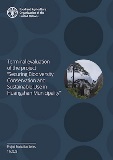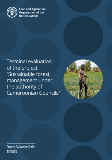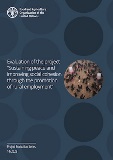Completed evaluations

Terminal evaluation of the project “Strengthening capacities of agricultural producers to cope with climate change for increased food security through the Farmer Field School approach in Mozambique”
12/09/2023
The evaluation recommended that FAO support the government to ensure the integration of CCA into key policy documents and the integration of the Farmer Field Schools (FFS) into future rural development programmes, including the new Sustenta Programme, and that, in future programmes, FAO will focus on developing value chains and promoting farmers' access to markets.

Evaluation of the project “Smallholder Agriculture Development and Commercialization Project of the Ministry of Agriculture”
01/09/2023
The project, funded by the World Bank, benefited from FAO Technical Assistance under Subcomponent 1.1 on capacity building through the Farmer Field School (FFS) approach. The organizational and leadership assets generated by FFS among smallholder farmers are by far the project's most important and effective contributions to better outcomes.

Terminal evaluation of the project “Sustainable cropland and forest management in priority agro-ecosystems of Myanmar”
01/09/2023
The project aimed to build the capacity of farming and forestry stakeholders to mitigate climate change and improve land conditions by adopting climate-smart agriculture and sustainable forest management policies and practices. Its geographical focus was five townships in three priority agroecosystem zones: Ayeyarwady Delta, Central Dry Zone, and an upland, shifting cultivation zone.

Terminal evaluation of the project “Securing Biodiversity Conservation and Sustainable Use in Huangshan Municipality”
01/09/2023
The project was implemented in China (Huangshan Municipality) and funded by the Global Environment Facility. The rationale behind the project intervention was that the biodiversity conservation objectives were not being fully achieved through the existing mechanisms. The final independent evaluation of the project rated it as Satisfactory, and verified that most of the outcomes and outputs of the project were achieved.

Terminal evaluation of the project “Sustainable forest management under the authority of Cameroonian Councils”
08/08/2023
The final evaluation found the project was highly relevant to the needs of national governments and of Cameroonian councils, the FAO, and GEF. Significant capacity building of local council officials, Peasant Forest Committees and Council Forest Cells were achieved on sustainable forest management issues and carbon management. Project gains are likely to continue beyond the project but this is contingent on actions taken to address financial, institutional, social and environmental risks.

Evaluation of the project "Sustaining peace and improving social cohesion through the promotion of rural employment"
07/08/2023
The evaluation provides an independent assessment of the extent to which planned collective objectives have been met, and the project’s contribution to its peacebuilding objectives. It also aims to draw lessons and recommendations to inform future projects. The evaluation used a consultative and participatory approach involving all project stakeholders. Mixed methods such as desk review, semi-structured interviews, focus group discussions and field observations were used to collect information.

Evaluation of the project “Promotion of peaceful transhumance in the Liptako Gourma region”
07/08/2023
The project aimed to contribute to peace and security in Liptako-Gourma, a region historically exploited by transhumant herders and farmers, which is now experiencing an increase in inter-community conflicts and armed attacks which increase poverty and the vulnerability of populations. The results of the project are generally satisfactory. (French only)

Evaluation of FAO's contribution to Nigeria 2016–2022
20/07/2023
The evaluation assessed FAO's contribution to Nigeria from 2016 to 2022, focusing on national priorities for the agriculture sector and food systems, with a special lens on gender equality, leave no one behind principles, the humanitarian–development–peace nexus and climate change mainstreaming. The evaluation recommends prioritizing flagship initiatives, engaging ministries, national actors and implementing a gender stocktaking exercise to identify those at risk of being left behind.

Terminal evaluation of the project “Dynamic conservation and sustainable use of agricultural biodiversity to ensure food security and ecosystems services and resiliency”
21/06/2023
This project supports the Government of the Philippines in efforts to conserve the country’s globally important agrobiodiversity and traditional agroecosystems. The project aligned strongly with the government, FAO and GEF priorities, and impressive progress was made on policy objectives. Recommendations focused on developing a successful exit strategy, capturing experience effectively, and carrying out a systems review for future FAO-supported agrobiodiversity projects.

Terminal evaluation of the project "Biodiversity conservation and sustainable use in five macroregions to improve human nutrition"
22/05/2023
The objectives of this project were: keeping agrobiodiversity in situ in five macro-ecoregions and improving the livelihoods of the local population; and managing and taking advantage of agrobiodiversity to sustainably improve food and nutritional security with improved access of Indigenous populations and local communities to nutritional and diversified diets. (Spanish only)
